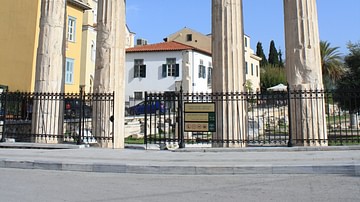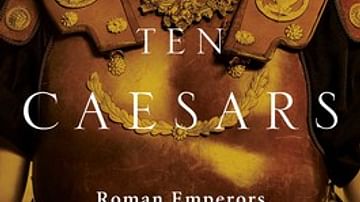Search
Search Results

Article
Gibbon's Decline & Fall of the Roman Empire
The English historian Edward Gibbon (1737-1794) wrote and published his seminal work History of the Decline and Fall of the Roman Empire between 1776 and 1788. The dominant theme of Gibbon's six-volume work is that the fall of the Roman Empire...

Article
Roman Expeditions in Sub-Saharan Africa
Sub-Saharan Africa was explored by Roman expeditions between 19 BCE - 90 CE, most likely in an effort to locate the sources of valuable trade goods and establish routes to bring them to the seaports on the coast of North Africa, thereby minimizing...

Article
Hellenistic & Roman Agora of Athens
Pericles’ agora of Athens flourished under Macedonian control. After Macedon was defeated by Rome, the Romans added to the district even before Greece was taken as a province and more so afterwards. The Roman version of the agora continued...

Interview
Interview: Barry Strauss on Ten Caesars
Dr. Barry Strauss' Ten Caesars: Roman Emperors from Augustus to Constantine tells the epic story of the Roman Empire from its rise to its eastern reinvention, from Augustus, who founded the empire, to Constantine, who made it Christian and...

Article
The Roman Toga
The toga was an item of clothing worn by men who were citizens of Rome. The toga consisted of a single length of wool cloth cut in a semicircle and wrapped around the body of the wearer without any fastenings. The Roman toga was a clearly...

Article
Roman Women in Business
Roman women faced legal, ideological, and cultural limitations in several areas of their lives; deep-rooted traditions regarding the role of women in the Roman world resulted in pre-conceived views which saw women characterised by weakness...

Article
Legacy of the Ancient Romans
The legacy of the ancient Romans – from both the time of the Roman Republic (509-27 BCE) and the time of the Roman Empire (27 BCE - 476 CE) – exerted a significant influence on succeeding cultures and is still felt around the world in the...

Article
Family Planning in Greco-Roman Antiquity
Family planning was a topic of vital importance in the ancient Mediterranean. Some of the earliest medical literature from ancient Greece and Rome deals with fertility and reproductive health. Among the numerous treatments and procedures...

Article
Battle of Teutoburg Forest
At the Battle of Teutoburg Forest (aka Battle of Varus), c. 9 CE, a combined force of Germans annihilated a Roman army consisting of three legions including three squadrons of cavalry and six cohorts of auxiliary troops. As some soldiers...

Definition
Roman Senate
The Roman Senate functioned as an advisory body to Rome's magistrates and was composed of the city's most experienced public servants and society's elite. Its decisions carried great weight, even if these were not always converted into laws...